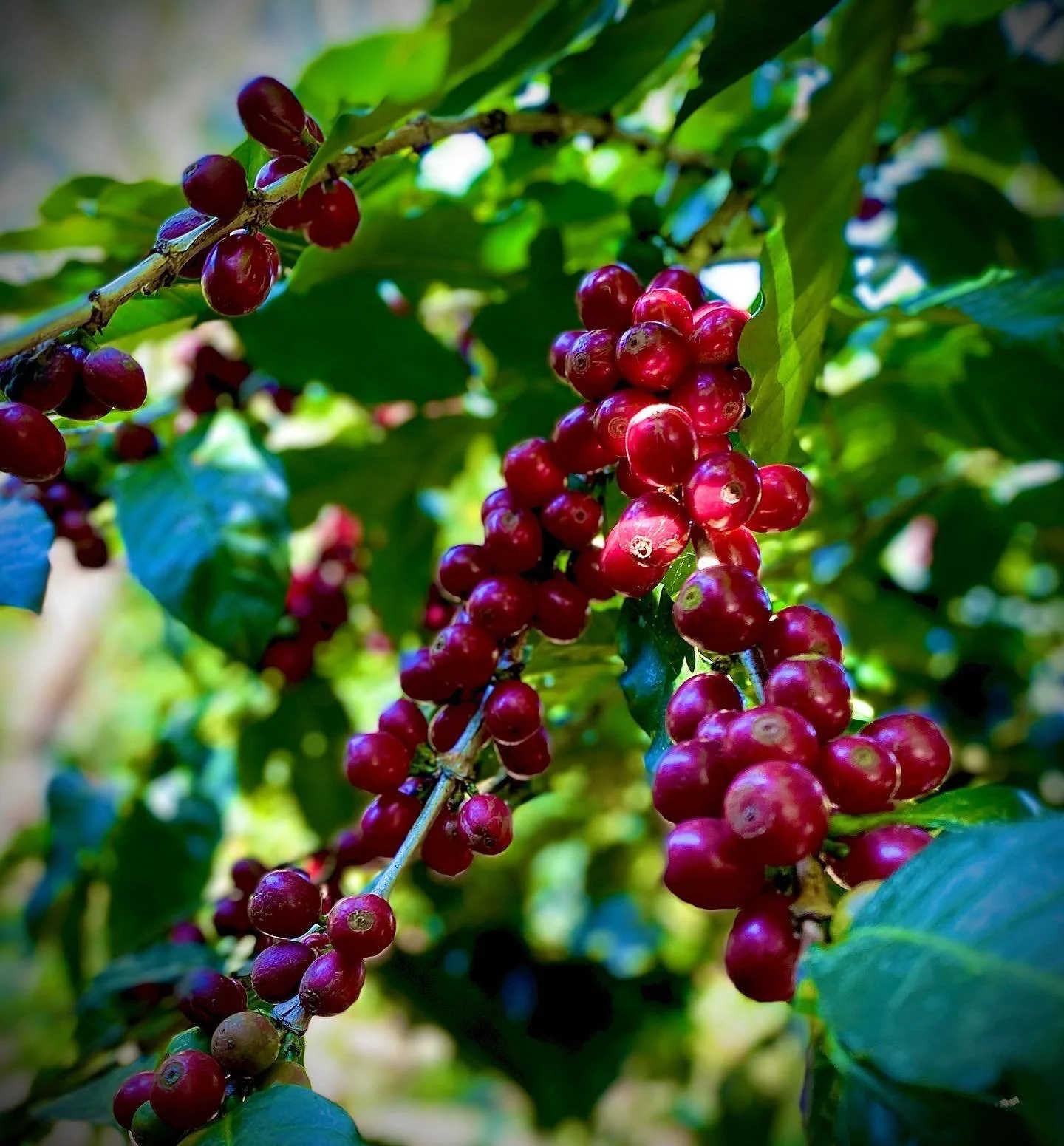Don Alexis Gesha - Costa Rica
Don Alexis Coffee embodies regenerative agroforestry farming principles by intercropping nitrogen-fixing trees that enhance soil fertility. A variety of fruit trees provide essential shade for the coffee plants, fostering a biodiverse ecosystem that supports local wildlife while improving economic stability.
Don Alexis Coffee embodies regenerative agroforestry farming principles by intercropping nitrogen-fixing trees that enhance soil fertility. A variety of fruit trees provide essential shade for the coffee plants, fostering a biodiverse ecosystem that supports local wildlife while improving economic stability.
Don Alexis Coffee embodies regenerative agroforestry farming principles by intercropping nitrogen-fixing trees that enhance soil fertility. A variety of fruit trees provide essential shade for the coffee plants, fostering a biodiverse ecosystem that supports local wildlife while improving economic stability.
Origin: Costa Rica, Los Santos
Producer: Don Alexis Coffee
Altitude: 2000 masl
Variety: Gesha
Process: Natural
Tasting Notes
STRAWBERRY / ORANGE BLOSSOM / BANANA
The natural Gesha produced here is a wonderful fruity and floral experience with notes in the cup of strawberry, orange blossom and banana.
AGROFORESTRY COFFEE
Owned by the Ramirez-Navarro family, its founder and father of the family Mr. Alexis Ramirez was a farmer that dedicated his entire life to agriculture.
Don Alexis' coffee farm stands as a model of regenerative agricultural practices. By promoting biodiversity, protecting natural resources, and fostering community well-being, the farm not only produces high-quality coffee but also supports the local ecosystem and population.
Below are the key regenerative agricultural practices implemented on the farm:
- Sustainable Water Management
The farm contains several natural water springs that provide water to the surrounding town. Recognizing the importance of preserving this vital resource, Don Alexis uses only environmentally safe products for farming, ensuring that water runoff does not contaminate the water sources. This approach helps maintain water purity for both the community and the environment, safeguarding the area's water supply and contributing to the regeneration of the local ecosystem.
The Penagos machine that they use does not require Don Alexis to use a water pool for flotation and removing unripe coffees when picked and before making the specific processes. Instead, the Penagos machine can classify the higher quality beans when peeling into A grade and B-C grade beans without the use of water.
- Soil Health and Nutrient Management
Twice a year, Don Alexis performs detailed soil and leaf testing to monitor the nutrient needs of the coffee trees. By adjusting fertilization based on the specific nutrient requirements, the farm ensures that the coffee plants receive exactly what they need, avoiding overuse of fertilizers and maintaining soil health. This strategy nurtures long-term soil fertility and contributes to the overall resilience of the farm, enhancing the productivity and sustainability of the ecosystem.
- Erosion Control and Soil Protection
Weeds are left on the soil surface rather than being removed, offering a natural shield against soil erosion. These weeds not only help retain moisture in the soil but also serve as organic matter that decomposes into compost, enriching the soil with nutrients. This practice improves soil structure, enhances water retention, and reduces the need for artificial inputs, fostering natural soil regeneration. This soil management also helps sequestrate and fix CO2 in the soil.
- Biodiversity and Agroforestry
In alignment with regenerative farming principles, the coffee plantation is intercropped with nitrogen-fixing trees, which naturally enhance soil fertility. Additionally, a variety of fruit trees provide shade for the coffee plants, encouraging the growth of a biodiverse ecosystem. These trees support local wildlife, particularly birds that aid in pollination, creating a vibrant and healthy environment. The farm also grows avocado trees, which not only contribute to biodiversity but are also sold as a secondary source of income for the farmer. This diversified system promotes resilience and economic stability, reinforcing the farm's sustainability goals.
- Waste Management and Composting
All organic waste from coffee processing, such as coffee cherry skins and mucilage water, is repurposed as compost. This waste is stored in a compost pond adjacent to the wet mill and, after composting, is used as a natural fertilizer for the farm. This closed-loop system reduces the farm's reliance on external inputs, prevents waste from polluting local ecosystems, and returns valuable nutrients to the soil, contributing to soil regeneration.
- Social Sustainability and Community Involvement
The farm employs 10 full-time workers, providing stable livelihoods for local families year-round. During harvest season, an additional 20 seasonal workers, who return annually, help with the coffee picking. This consistent employment structure fosters strong community bonds and ensures a dependable income for the workers, enhancing the social sustainability of the farming operation. By supporting local workers and their families, Don Alexis ensures that the farm's regenerative practices benefit not just the environment but also the local population.
The variety
Gesha
Gesha is a special coffee variety that originates from Ethiopia but has gained global recognition due to its exceptional quality and unique flavor profile. Gesha coffee cherries are known for their distinctive elongated shape and characteristic flavors that range from floral and fruity to tea-like with delicate aromas. The coffee often exhibits bright acidity and a complex taste, with notes of jasmine, bergamot, peach, citrus, and sometimes subtle spicy undertones. The mouthfeel can be silky and elegant.
Growing Gesha coffee requires a lot of attention and care, as the variety is sensitive to its environment and growing conditions. Gesha plants thrive at high altitudes, with a precise balance of sunlight, rainfall, and soil quality. By optimizing these specific growth conditions, coffee producers can cultivate high-quality Gesha coffee that is highly sought after among coffee enthusiasts.
The processing
Natural
Ripe cherries are harvested, sorted, and then allowed to rest in plastic bags for 24 hours. Following this, they undergo traditional drying on raised beds for about 30 days, which enhances the sweetness and floral notes of this exquisite variety.







